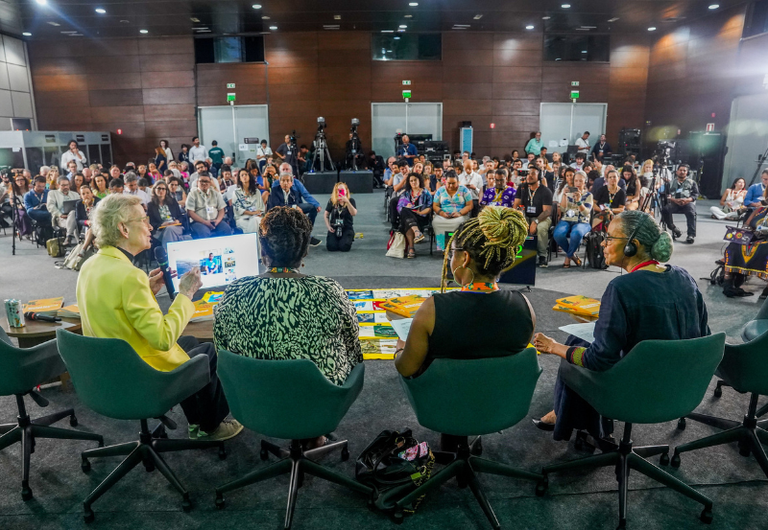 On Tuesday, November 18, authorities, experts, and representatives from civil society advocated for a global ethical commitment to guide international efforts in addressing climate change. This theme guided the high-level panel, “Global Ethical Stocktake: An Ethical Mutirão for Climate Action (Ethical Collective Effort for Climate Action),” held in the Blue Zone of COP30.
On Tuesday, November 18, authorities, experts, and representatives from civil society advocated for a global ethical commitment to guide international efforts in addressing climate change. This theme guided the high-level panel, “Global Ethical Stocktake: An Ethical Mutirão for Climate Action (Ethical Collective Effort for Climate Action),” held in the Blue Zone of COP30.
The meeting presented the trajectory of the Global Ethical Stocktake (GES), an initiative that integrates COP30’s leadership architecture. Throughout the year, the GES has gathered contributions from various sectors—Indigenous communities, civil society, local governments, religious sectors, academia, and youth—to consolidate ethical principles that aid the implementation of climate agreements already undertaken.
The GES approach seeks to offer, in the words of the participants, an “ethical compass” for global climate action, complementing technical diagnoses and strengthening decisions that align with justice, solidarity, and shared responsibility.
During the panel, the importance of building a common direction that aligns ethical values and tangible commitments was stressed. The Minister of Environment and Climate Change (MMA), Ms. Marina Silva, highlighted that the process inaugurates “a map to direct us to the safe point of a fairer, more sustainable model that leaves no one behind and allows us to live in peace among our societies, with ourselves, and with nature.”
She also warned against the advance of an “ethics of circumstance,” characterized by the relativization of facts and the weakening of fundamental values. According to the Minister, the global effort needs to be based on principles that provide stability to the commitment to justice and freedom.
Ms. Mary Robinson, former president of Ireland and co-leader of the GES Regional Dialogue in Europe, pointed out that ethical mobilization broadens the traditional concept of Nationally Determined Contributions (NDCs). Recalling discussions from the “Spreading Hope Conference” in Rome, Robinson stated that a movement is now emerging that she calls “people-determined contributions.” This movement reflects social expectations for more ambitious responses to warming above 1.5°C.
For Ms. Robinson, “people want climate action” and demonstrate growing concern about sensitive ecosystems such as coral reefs and the Amazon. Ms. Cecilia Kinuthia-Njenga, Director of the Intergovernmental Support and Collective Progress Division at the UNFCCC, recalled the experience of the first Global Stocktake of the Paris Agreement, concluded at COP28, and highlighted how the GES has advanced in broadening social participation. According to her, the six regional dialogues promoted around the world “were a real opportunity for all voices to participate in the process.”.
Ms. Kinuthia-Njenga also affirmed that ethical values are beginning to influence multilateral negotiations in tangible terms. “Decisions will be guided by principles such as justice, solidarity, and shared responsibility.”
For COP30 Youth Champion and panel moderator Ms. Marcele Oliveira, the meeting is “a milestone toward the greater objective of the Global Ethical Stocktake: inspiring multilateral decisions that are fairer, more humane, more inclusive, and consistent with the scale of the emergency we face..
The GES process is aligned with the commitments signed by nearly 200 countries on renewable energy, energy efficiency, combating deforestation, and just transition. The regional dialogues—held across all continents—brought together Indigenous leaders, political, religious, and community representatives, as well as scientists, artists, and activists.
These discussions consolidated recommendations that will be delivered to the COP30 Presidency and the UNFCCC in a Global Report, bringing together priority guidelines for Heads of State and negotiators. The document features principles of justice, equity, solidarity, and multilateral cooperation, with a focus on implementing the climate agreements already established, especially the Paris Agreement and the decisions of COP28.
The conclusions underscore the urgency of transitioning to more sustainable production and consumption models to limit global warming to below 1.5°C. This process includes Self-Managed Dialogues, which expand the local and community reach of the GES.
In addition to guiding fairer decisions, the goal is to integrate recommendations into the COP30 Action Agendas, influencing areas such as human development, climate finance, just transition, biodiversity, culture, and education.



